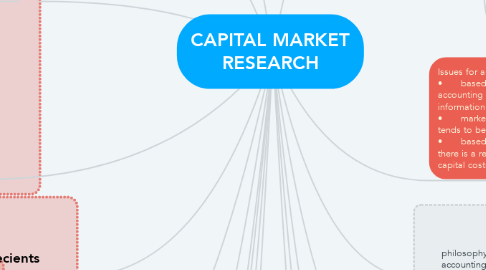
1. Impact Of Accounting Profits Announcements on Share Prices
1.1. motivation behind positive accounting theory was to determine the information content that accounting profit had for the stock market, in light of the criticisms by normative theorists of historical cost methods of calculating profit.
1.2. Ball and Brown tested the usefulness of the historical cost profit figure to the investment decisions.
1.2.1. unexpected increases in profits represents new information for the market.
2. Information Asymmetry and Firm Size
2.1. unexpected profits announcements may be inversely related to firm size; that its, the smaller the firm, the more information is contained in accounting reports
2.2. Freeman agues
2.2.1. Larger firms providing a greater variety of information than smaller firms
2.2.2. Larger firms having a higher degree of exposure by constant reporting in the financial press and by the search activities of financial analysts.
2.3. Institutional investors are more likely to trade in large firms owing to liquidity and contractual constraints.
3. Association Studies and Earnings response Coeffiecients
3.1. These studies measure the impact of accounting measures on share prices over a longer event window (usually one year or longer)
4. Factors which can affect the ERC
4.1. Risk and Uncertainty
4.2. Audit quality
4.3. Industry
4.4. Interest rates
4.5. Financial Leverage
4.6. Firm Growth
4.7. Permanent and temporary profits
4.8. Non-linear modeling
4.9. Disaggregating profits
4.10. Cash flows
4.11. Balance sheet and balance sheet components
5. Methodological issues
6. positive accounting theory are based on assumption about the behavior of individuals
6.1. managers, investors, lenders and other individuals are assumed to be rational. evaluative financial utility maximizers
6.2. managers have disretion to choose accounting policies that directly maximize their utility or to alter the firms financing, investment and production policies to directly maximize their self-interest
6.3. managers will take actions that maximize the value of the firm
7. two types of capital market research
7.1. the impact of the release of accounting information on share returns
7.2. the effects of changes in accounting policy on share prices
8. based on dubious assumptions
8.1. there are no transaction costs in trading securities
8.2. informations is available cost-free to all market participants
8.3. there is agreement on the implications of current information for the current price and distributions of future prices
9. market model
9.1. derives from CAPM
9.2. used to estimate abnormal returns on shares when profits announced
9.3. share prices and returns are affected by both market-wide and firm-specific events
9.4. market-wide events must first controlled for
10. Magnitude
10.1. Unexpected profits and abnormal returns
11. Volatility
12. Trading Strategies
12.1. based on empirical evidence the market can be influenced by accounting data • information changes after the announcement • winner - losser strategies and optimistic attitude of financial analysis
12.2. Mechanistic or behavioural effect
12.2.1. • Cosmetic accounting Two hypotheses have been developed : 1. The market reacts mechanistically to changes in accounting numbers, regardless of whether they are cosmetic or cash flow implications. 2. The market ignores accounting changes which have no cash flow consequences
12.3. Manipulating Accounting Numbers
12.3.1. The profit generated from GAAP is an imperfect measurement result.
13. Issues for auditors • based on empirical evidence, accounting profit contains information (stock price). • market reaction to accruals tends to be biased. • based on empirical evidence there is a relationship between capital costs and audit quality.
14. philosophy of positive accounting theory
14.1. milton fredman stated
14.2. watts and Zimmerman stated
15. strenght of positive theory
15.1. positive hypotheses are capable of falsification by empirical research
15.2. overcome the weakness of normative theory where that give the understanding of how it works not how it supposed to be working because normative theory based on policy that might not suitable with the actual state
15.3. in capital market research gives the understanding the relation between accounting and stock price
16. forms of information efficiency
16.1. weak form (past price information)
16.2. semi-strong form (publicly available information)
16.3. strong form (all information-public and private)
17. market efficiency does not assume mean or imply
17.1. that every or many investor has knowledge of all information
17.2. that all financial information has been correctly presented or interpreted by individual investors
17.3. that managers make the vest decisions
17.4. that investors can predict the future precisely
18. the market model based on dubious assumptions
18.1. investors are averse
18.2. returns are normally distributed and investors select their portfolios on this basis
18.3. investors have homogeneous expectations
18.4. market are complete
18.4.1. all participants are price takers
18.4.2. there are no transaction costs
18.4.3. there are no taxes
18.4.4. there are rational expectations by investors
